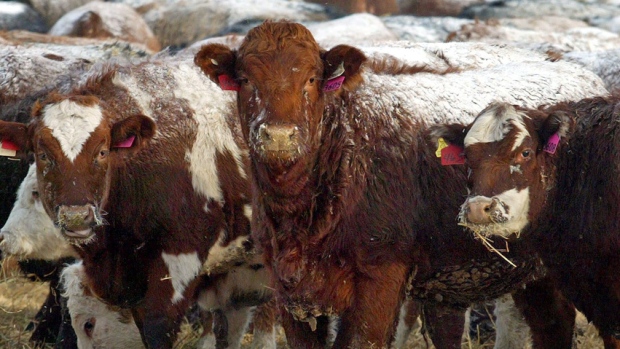Frozen Machinery and Sick cows while Farmers Struggle During Extreme Cold

The cows at Ferme Racine in Casselman, Ont., let farmers know when their barn’s pipes have frozen
By Andrew Foote – CBC News
“If they’re all surrounding the [empty water] bucket, you’ll see there’s something wrong,” said dairy farmer Marc-Antoine Racine.
“You can see they’re thirsty, so you know it’s time to reheat the pipes.”
Livestock farmers in eastern Ontario are dealing with frozen equipment and sick animals during this winter’s extreme cold snap, with prolonged stretches of temperatures below –20 C and wind chill making it feel as cold as –40.
You go [to the barn] in the morning and hope there’s nothing frozen.
Racine said in a phone interview Saturday that a diesel tank and feed machinery at his farm have also frozen up.
But it’s the pipes that freeze once a day — or more.
“You go [to the barn] in the morning and hope there’s nothing frozen,” Racine said. “Because if there is, you know you’ll lose minimum an hour unfreezing the barn.”
“Farmers are quite adaptable in these situations”
A Lot of Pneumonia
Unlike dairy cattle, beef cattle spend much of their time outside, said Amber Payne of Arc Acres Farm in south Ottawa.So while they’ve dealt with frozen infrastructure, the big drop in temperature means their cattle are also getting sick.
“When the temperature drops down to –40, they find it really hard,” Payne said.
“You deal with a lot of pneumonia in those cases. You’ll see cattle that look a little bit lousy, they’re not eating as aggressively, they’ve got a cough … they could die quite quickly if you don’t treat it right away.”
Payne said it’s more difficult right now to keep cattle in good health because an extremely wet summer wasn’t good for hay, which cattle eat over the winter.
“Farmers are quite adaptable in these situations [but the cold] just makes the chores a little longer every day,” she said.
“Sleepless nights, getting up in the middle of the night and checking things, worrying about babies being born too — there’s a lot of cows that are typically due in January.”
There are also pigs at Arc Acres Farm, which Payne said do well in the cold — as long as they have good bedding, limited exposure to the wind, and other pigs to huddle up with.












